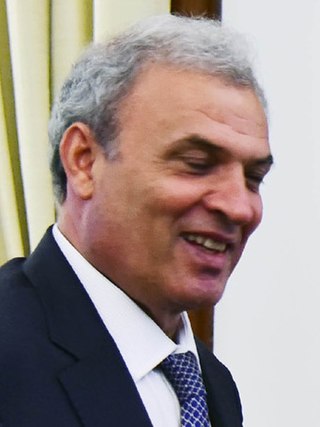Top Qs
Timeline
Chat
Perspective
Ziad Abu Amr
Palestinian politician and writer (born 1950) From Wikipedia, the free encyclopedia
Remove ads
Ziad Abu Amr (Arabic: زياد أبو عمرو; born 22 January 1950) is a Palestinian politician, author, and member of the Palestinian Legislative Council. He served as Deputy Prime Minister of Palestine and is a member (independent) of the PLO Executive Committee. From 17 March 2007 to 14 June 2007, he was Minister of Foreign Affairs. On 6 June 2013, Ziad Abu Amr was appointed as Deputy Prime Minister of the Palestinian Authority by President Mahmoud Abbas.[2]
Remove ads
Background
Born in Gaza City on 22 June 1950, Abu Amr attended Damascus University in Syria, where he earned a bachelor's degree in English literature and language in 1973.[3][4] He studied at Georgetown University in Washington, D.C., receiving a master's degree in Arab studies from the Center for Contemporary Arab Studies in 1979 and a PhD in Philosophy and Comparative Politics in 1985.[4][5] After working as a teacher in Bahrain, Oman, and Syria in the 1970s, he taught political science at Birzeit University in Ramallah from 1985 to 1993.[4]
Abu Amr is a US citizen.[1]
Remove ads
Political career
Summarize
Perspective
Running as an independent candidate in the 1996 Palestinian general election, he won a seat in the Palestinian Legislative Council (PLC) representing Gaza City. During this period, he was chairman of the PLC's political committee.
He was re-elected in legislative elections that took place on 25 January 2006, winning 55,748 votes.[6]

From April to October 2003, he was Minister of Culture in the government of Prime Minister (now President) Mahmoud Abbas.[8][9]
After a period of factional violence in the Palestinian territories in early 2007, the Hamas-led government resigned on 15 February. Prime Minister Ismail Haniyeh formed a new national unity government with Abu Amr as foreign minister.[10] The cabinet was approved by the PLC and its members took office on 18 March.
On 6 June 2013, Ziad Abu-Amr was appointed as Deputy Prime Minister of the Palestinian Authority by President Mahmoud Abbas.[2]
He is associated with many political associations, including the Palestine Center in Washington D.C., the Palestinian Council on Foreign Relations, the Palestinian Academic Society for the Study of International Affairs (PASSIA), and MIFTAH, a Palestinian civil rights organization.[5]
Remove ads
Political ideology and views
Abu Amr is considered a reform-minded politician and part of the "young guard" of Palestinian leaders. He has, at times, been critical of the Palestinian Authority administration and security services.[3][5] He has mediated talks between the two main Palestinian factions, Hamas and Fatah, and is widely respected by both groups.[3][9]
A proponent of democracy and democratic elections, he has been a supporter of representation for opposition groups such as Hamas and Islamic Jihad, claiming that they would be held more accountable for their actions.[3]
In 2025, Middle East Eye reported Abu Amr was key to proposing a plan to use the PA security forces to fight for PA control of the Gaza Strip.[1]
Miscellaneous
Abu Amr is married and the father of five children. Currently, he lives in Ramallah, West Bank. He has published several books, the most well-known being Islamic Fundamentalism in the West Bank and Gaza: Muslim Brotherhood and Islamic Jihad.[11]
See also
References
External links
Wikiwand - on
Seamless Wikipedia browsing. On steroids.
Remove ads

